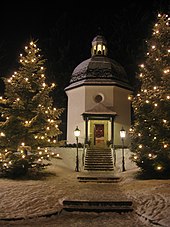Silent Night: Difference between revisions
→Lyrics: comma is needed in the first verse. See http://www.hymnsite.com/lyrics/umh239.sht |
m Undid revision 647118657 by Walter Görlitz (talk): the cited source (correctly) doesn't doesn't use a comma – it's 1 person, the "virgin mother", not 2, a virgin AND a mother |
||
| Line 47: | Line 47: | ||
Christ, in deiner Geburt! |
Christ, in deiner Geburt! |
||
Christ, in deiner Geburt!}}</poem> |
Christ, in deiner Geburt!}}</poem> |
||
|style="padding-left:2em;"|<poem>Silent night, |
|style="padding-left:2em;"|<poem>Silent night, holy night |
||
All is calm, all is bright |
All is calm, all is bright |
||
Round yon |
Round yon Virgin Mother and child. |
||
Holy infant, tender and mild |
Holy infant, tender and mild, |
||
Sleep in heavenly peace, |
Sleep in heavenly peace, |
||
Sleep in heavenly peace. |
Sleep in heavenly peace. |
||
Silent night, |
Silent night, holy night |
||
Shepherds quake at the sight |
Shepherds quake at the sight; |
||
Glories stream from heaven above |
Glories stream from heaven above, |
||
Heavenly hosts sing Hallelujah. |
Heavenly hosts sing Hallelujah. |
||
Christ the Savior is born, |
Christ the Savior is born, |
||
Christ the Savior is born. |
Christ the Savior is born. |
||
Silent night, |
Silent night, holy night |
||
Son of God, love's pure light |
Son of God, love's pure light; |
||
Radiant beams from thy holy face |
Radiant beams from thy holy face |
||
With the dawn of redeeming grace, |
With the dawn of redeeming grace, |
||
Jesus, Lord at thy birth |
Jesus, Lord at thy birth, |
||
Jesus, Lord at thy birth.</poem> |
Jesus, Lord at thy birth.</poem> |
||
|} |
|} |
||
Revision as of 07:35, 15 February 2015

"Silent Night" (Template:Lang-de) is a popular Christmas carol, composed in 1818 by Franz Xaver Gruber to lyrics by Joseph Mohr in the small town of Oberndorf bei Salzburg, Austria. It was declared an intangible cultural heritage by UNESCO in 2011.[1] The song has been recorded by a large number of singers from every music genre.
History

The song was first performed on Christmas Eve 1818 at St Nicholas parish church in Oberndorf, a village on the Salzach river. A young priest, Father Joseph Mohr, had come to Oberndorf the year before. He had already written the lyrics of the song "Stille Nacht" in 1816 at Mariapfarr, the hometown of his father in the Salzburg Lungau region, where Joseph had worked as a coadjutor.
The melody was composed by Franz Xaver Gruber, schoolmaster and organist in the nearby village of Arnsdorf. Before Christmas Eve, Mohr brought the words to Gruber and asked him to compose a melody and guitar accompaniment for the church service. [2] Both performed the carol during the mass on the night of December 24.
The original manuscript has been lost. However a manuscript was discovered in 1995 in Mohr's handwriting and dated by researchers at ca. 1820. It shows that Mohr wrote the words in 1816 when he was assigned to a pilgrim church in Mariapfarr, Austria, and shows that the music was composed by Gruber in 1818. This is the earliest manuscript that exists and the only one in Mohr's handwriting.
The story behind composing the song was the subject of Christian Vuissa's 2012 film de.[3] It was also the subject of the 2014 documentary The First Silent Night, narrated by Simon Callow.[4]
Translations
In 1859, the Episcopal priest John Freeman Young, then serving at Trinity Church, New York City, published the English translation that is most frequently sung today.[5] The version of the melody that is generally used today is a slow, meditative lullaby, differing slightly (particularly in the final strain) from Gruber's original, which was a sprightly, dance-like tune in 6/8 time. Today, the lyrics and melody are in the public domain.
The carol has been translated into about 140 languages.[6][7]
The song was sung simultaneously in English and German by troops during the Christmas truce[8] of 1914 during World War I, as it was one carol that soldiers on both sides of the front line knew.
Lyrics

| German | Most common English lyrics |
|---|---|
Stille Nacht, heilige Nacht, |
Silent night, holy night |
References
- ^ "Österreichische UNESCO-Kommission - Nationalagentur für das Immaterielle Kulturerbe - Austrian Inventory". Retrieved 25 December 2014.
- ^ "BBC Religion & Ethics". bbc.co.uk. 2009-08-04. Retrieved 2011-12-06.
- ^ Stille Nacht (2012) at IMDb
- ^ First Silent Night, The, production details
- ^ Underwood, Byron Edward, "Bishop John Freeman Young, Translator of 'Stille Nacht'", The Hymn, v. 8, no. 4, October 1957, pp. 123–132.
- ^ Ronald M. Clancy, William E Studwell. Best-Loved Christmas Carols. Christmas Classics Ltd, 2000.
- ^ "Silent Night". Silent Night Web.
- ^ Stanley Weintraub Silent Night: The Remarkable Christmas Truce of 1914. New York: Free Press, 2001.
External links
 Media related to Stille Nacht at Wikimedia Commons
Media related to Stille Nacht at Wikimedia Commons- Free arrangements for piano and voice from Cantorion.org
- Text and music, Stille-Nacht-Association, Salzburg
- Silent Night Chapel, origin of song

